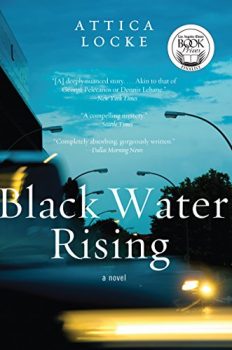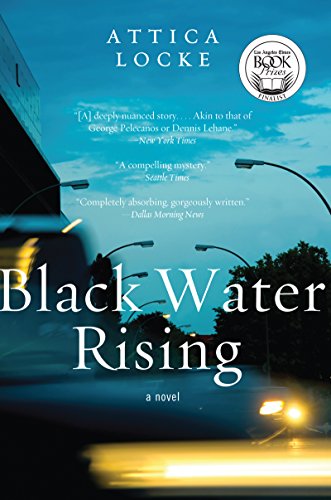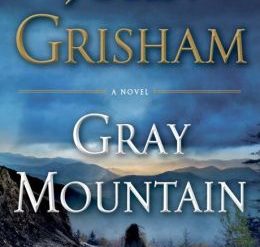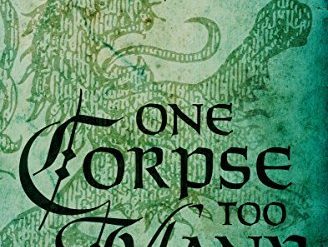
In her debut as a novelist, the award-winning mystery author Attica Locke explored themes of Black Power, trade union racism, corporate crime and political corruption. It’s the stuff that might have elevated Black Water Rising into the ranks of Great American Novels. Although she fell short, the effort was worthy enough that The Guardian characterized it as “a powerful and skillfully constructed conspiracy thriller—Chinatown without the air of despairing fatalism.” By contrast, Janet Maslin, writing in the New York Times, found it “overwritten” and “muddied.” My own reading of the book is much closer to The Guardian‘s. Although I thought the story confusing at times, and I couldn’t always understand why the protagonist acted as he did, I felt deeply engaged and satisfied as the book came to an understandable if inconclusive end.
Black Water Rising (Jay Porter #1) by Attica Locke (2009) 452 pages @@@@ (4 out of 5)
A puzzling murder leads to a tangled web of corporate crime and political corruption
Set in Houston in 1981, Black Water Rising follows the life of a young African-American man from his youth as a Black Power activist close to Stokely Carmichael to his career as a struggling attorney a decade later. Jay Porter is married with a child well on the way when he and his wife are witness, of sorts, to a murder. Jay’s own history of a felony arrest for striking a government informer at a Black Power rally persuades him not to report the experience to the police. After all, his case had gone to trial, and only a single Black juror had saved him. And that bad decision not to go to the police—one of many—drags him into a conflict involving a contract killer and Houston’s corporate elite.
The roots of this tale lie in the Black Power movement of the 1970s
Meanwhile, Jay’s father-in-law, Rev. Al Boykins, guilt-trips him into helping the Black dockworkers who are on the verge of striking for equal pay. Amidst the drama and occasional violence of the vote on the strike, Jay is forced to confront his college girlfriend at the University of Houston, now the city’s Mayor. (“Yeah, he knows the Mayor. Of course, she’s been trying to forget him ever since she ran for office, paying a whole slew of consultants to bury her past.”) Much of the suspense in Black Water Rising stems from Jay’s suspicion that Cynthia Maddox had been a Federal agent and betrayed him at the event that led to his arrest and trial. Little does he know who his real enemies are. They only come to light as he plumbs the depths of corporate crime and political corruption at the heart of this tale.
It’s all gloriously complicated and confusing. Some other book reviewer might otherwise say that the story “keeps you guessing to the end.” That’s true enough, I suppose. But I could have done with a little less guesswork and a few more of Jay’s decisions that rung true.
The historical context
Locke ably conjures up the tension and drama of the late 1960s and early 70s. In Black urban communities all across the country, a smattering of smaller Black Nationalist organizations competed with the Black Panther Party for attention. Huey P. Newton (1942-89), Eldridge Cleaver (1935-98), Fred Hampton (1948-69), and Stokely Carmichael (1941-98) all grabbed headlines and gained substantial followings in the years after the assassination of Rev. Martin Luther King Jr. And J. Edgar Hoover‘s (1895-1972) FBI saw in them a threat to the nation’s stability. Through a secret, illegal program called COINTELPRO, the FBI (with the support of local police) infiltrated Black Power groups not just with informers but with agents provocateurs as well. And Attica Locke places Jay Porter squarely in the center of this turmoil. Even years later, he still fears the long arm of the Federal government.
About the author
Attica Locke had established herself as a screenwriter before she turned to the novel with the publication of Black Water Rising. She has since written four other crime novels, including Bluebird, Bluebird, winner of the Edgar Award from the Mystery Writers of America. She has also continued her work as a writer and producer for television and film.
For additional reading
I’ve also reviewed two other Attica Locke novels:
- Bluebird, Bluebird – Highway 59 #1 (A compelling tale of murder, race, and family secrets)
- The Cutting Season (Attica Locke’s brilliant second mystery novel)
You might also enjoy my posts:
- Top 10 mystery and thriller series;
- 20 excellent standalone mysteries and thrillers;
- 5 top novels about private detectives; and
- Two dozen outstanding detective series from around the world.
For an abundance of great mystery stories, go to Top 20 suspenseful detective novels (plus 200 more). And if you’re looking for exciting historical novels, check out Top 10 historical mysteries and thrillers reviewed here (plus 100 others).
And you can always find my most popular reviews, and the most recent ones, plus a guide to this whole site, on the Home Page.



























